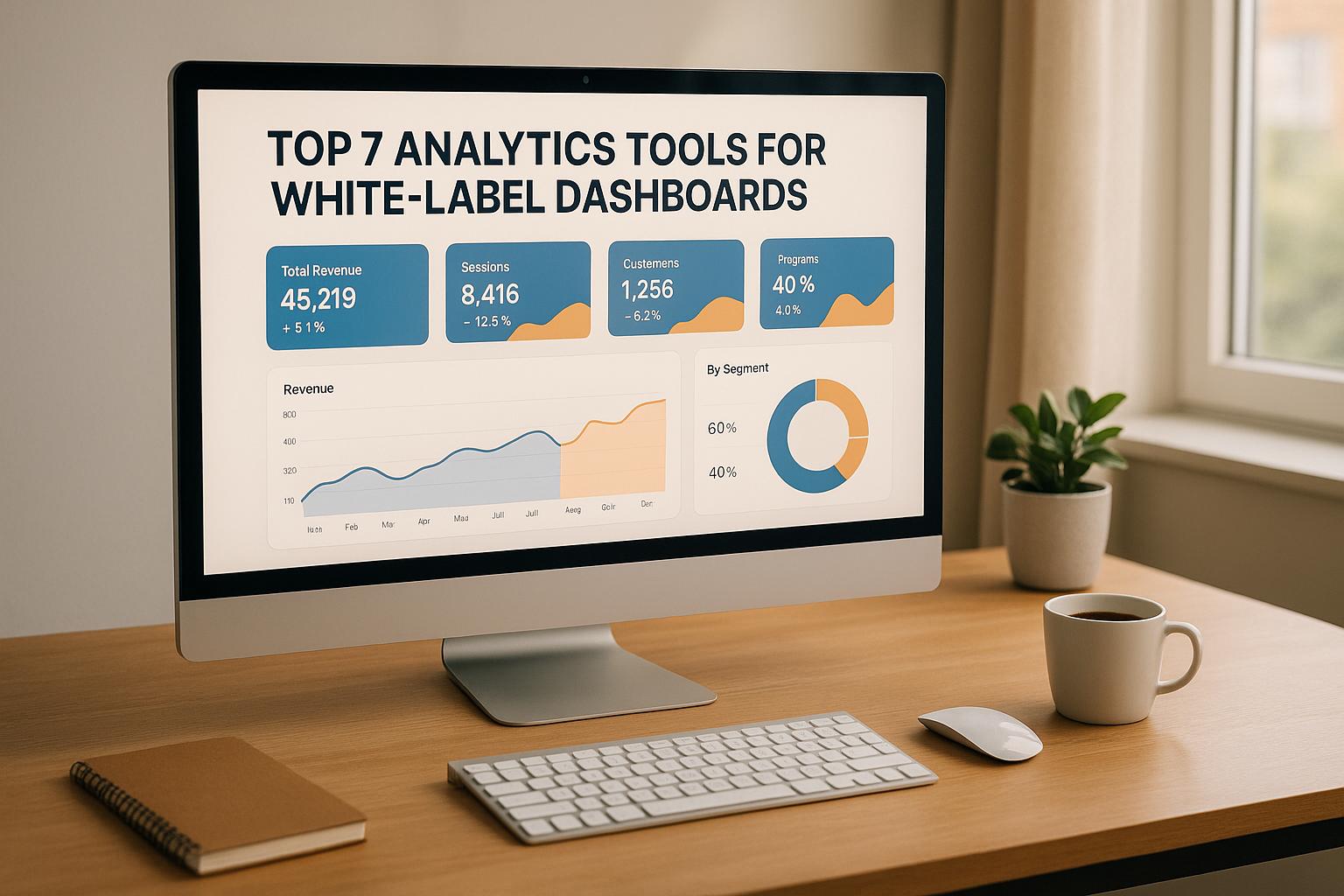AI has transformed cross-channel marketing by making campaigns smarter, faster, and more effective. Here's how:
- Personalized Experiences at Scale: AI tailors content to individual preferences in real time, across platforms like social media, email, and apps.
- Predictive Analytics: AI predicts customer behavior with high accuracy, helping businesses refine strategies.
- Faster Lead Management: Tools like White Label AI Solutions integrate with CRMs, reducing manual work by 55%.
- Content Optimization: AI-optimized formats (e.g., Reels, Shorts) boost shareability by up to 1,200%.
- Better Customer Support: AI chatbots provide 24/7 multilingual support, cutting response times by 80%.
Quick Overview:
| Feature | Improvement |
|---|---|
| Lead Generation | 60,000+ leads/month |
| Support Response Time | 80% faster |
| Content Engagement | 1,200% shareability increase |
| ROI | 4–7× return on marketing investments |
AI tools save time, reduce costs, and improve customer engagement. However, challenges like data privacy, fairness, and system integration remain critical for ethical implementation.
2025 AI Marketing Trends
Personal Marketing at Scale
AI is transforming personalized marketing by delivering experiences tailored to individual preferences across various channels. It processes real-time customer data to craft dynamic content that adapts instantly to user behavior. This means marketers can maintain relevance while managing personalization on a large scale - something that was nearly impossible before.
Predicting Customer Behavior
By 2025, predictive analytics has reached new heights. AI tools can now forecast customer actions with impressive accuracy. They analyze patterns from emails, social media, website visits, and purchase histories to predict future behavior and fine-tune marketing strategies.
A hybrid AI setup has emerged as a winning formula. For instance, businesses might use Claude 3 for handling routine customer inquiries while deploying GPT-4o to engage high-value leads. This combination has shown to boost conversion rates. The integration of predictive analytics with unified marketing data only strengthens these insights, making campaigns smarter and more effective.
Connecting Marketing Data
AI now excels at unifying marketing data from multiple sources. These systems automatically gather, interpret, and act on data to provide a complete view of customer interactions. The results speak for themselves:
| Metric | Improvement |
|---|---|
| Monthly Lead Generation | 60,000+ |
| Support Response Time | 80% faster |
| Content Engagement | 1,200% increase in shareability |
This seamless integration empowers marketers to make data-driven decisions with ease.
White-Label AI Tools
In 2025, white-label AI platforms are reshaping the way marketing agencies operate. These tools allow businesses to offer advanced AI-driven marketing solutions under their own brand. It's a win-win: agencies can expand their services while maintaining a consistent brand identity.
Additionally, advancements in natural language processing have enabled these tools to interact with customers in multiple languages, broadening the scope of cross-channel campaigns. Enhanced voice recognition and multilingual capabilities have further amplified customer engagement, especially in global markets.
These trends highlight how AI is redefining marketing strategies and paving the way for more impactful campaigns.
AI Marketing Advantages
Time and Cost Savings
AI tools are changing the game when it comes to saving time and cutting costs. For instance, manual lead entry has been reduced by 55%, freeing up teams to focus on strategy and creativity. By using hybrid systems - such as Claude 3 for routine questions and GPT-4o for handling high-value leads - companies can allocate resources more effectively and trim expenses. These improvements pave the way for more meaningful customer interactions.
Better Customer Response
AI isn’t just making operations smoother - it’s also revolutionizing how businesses connect with their customers. AI-powered chatbots have slashed support response times by 80% and handle over 60,000 leads every month. This level of efficiency ensures timely and more personalized engagement across various channels. On top of that, video content tailored for formats like Reels and Shorts has seen a staggering 1,200% boost in shareability. It’s clear that AI is helping brands connect with their audience in smarter, faster ways.
Marketing Budget Results
AI doesn’t just improve workflows - it also delivers impressive financial results. Businesses leveraging AI strategies have reported a 4–7× return on investment (ROI) by using features like pre-built campaign templates and compliance tools. Here’s a breakdown of how AI is driving these results:
| Area | Result |
|---|---|
| Content Creation | 30% reduction with GPT-4 captions |
| Lead Management | 55% decrease in processing costs |
| Customer Support | 80% faster response times |
| Campaign Performance | 4–7× ROI on bundled services |
For example, combining LinkedIn automation with white-labeled SEO audits powered by AI snapshot reports allows businesses to stretch their marketing dollars further while boosting campaign success. By integrating these tools, companies can achieve better outcomes without overspending.
The Future of Digital Marketing 2025: Supporting the AI-Assisted Marketer
Key Shifts in 2025
- ✅ AI Agents as Teammates: Marketers are no longer just "using" AI tools – AI agents now act as collaborators, executing campaigns, optimizing workflows, and generating content at scale.
- ✅ Real-Time Strategy: Predictive analytics and automated decision-making enable instant budget allocation, demand forecasting, and next-best-action planning.
- ✅ Personalization at Scale: Hyper-personalized experiences across ads, emails, and apps are managed through hybrid workflows where AI handles volume and humans refine tone.
- ✅ Generative Engine Optimization (GEO): With AI-driven search on the rise, brands adapt content strategies to ensure visibility in generative responses.
- ✅ Creative Innovation: New approaches like "Vibe Marketing" focus on emotional resonance, with AI turning abstract moods into campaigns.
- ✅ Massive CMO Investments: Over 70% of CMOs now allocate $10M+ annually to AI initiatives, cementing its central role in marketing strategies.
Human + AI Collaboration Framework
Strategy & Planning
➡️ AI predicts demand and allocates spend.
➡️ Humans align these insights with brand vision.
Creative Workflows
➡️ AI generates drafts, visuals, and ideas.
➡️ Humans provide storytelling, emotion, and cultural nuance.
Campaign Execution
➡️ AI autonomously buys media, optimizes targeting, and personalizes experiences.
➡️ Humans oversee ethics, compliance, and positioning.
Optimization
➡️ AI runs A/B tests and fine-tunes campaigns.
➡️ Humans interpret results, ensuring long-term consistency.
Search Visibility
➡️ AI-tailored metadata, llms.txt, and GEO ensure discoverability.
➡️ Humans craft content that is citation-worthy and aligned with authority building.
⭐ Takeaway
The marketer of 2025 is an AI-assisted strategist: blending machine-driven speed, scale, and precision with human creativity, empathy, and ethical oversight. Success lies not in replacing marketers, but in empowering them to thrive with AI teammates.
Problems and Ethics
While AI offers exciting possibilities, it also brings along a set of ethical and technical challenges that demand careful attention. As AI continues to reshape marketing, addressing these issues is essential to ensure its responsible and effective use.
Data Protection
AI marketing systems rely on collecting and analyzing vast amounts of customer data from various channels. This has made data privacy a pressing issue. By 2025, businesses will need to navigate increasingly complex privacy regulations while safeguarding sensitive customer information from sophisticated cyber threats. Research shows that AI can analyze browsing and purchase behaviors with remarkable precision, which only heightens concerns over data misuse.
To tackle these challenges, companies are turning to solutions like advanced encryption, strict access controls, and frequent security audits. These measures help identify vulnerabilities and maintain compliance with privacy laws. Strengthening data security is a critical step toward building ethical AI practices.
AI Fairness
Another key ethical concern is ensuring fairness in AI-driven marketing. Bias in AI algorithms can lead to unintended discrimination, which is why many companies are taking proactive steps to address this. Regular audits, the use of diverse datasets, and clear fairness benchmarks are becoming standard practices. Some leading organizations have even established AI ethics committees dedicated to reviewing algorithms before they are deployed. These committees play a vital role in ensuring that marketing strategies are equitable and inclusive.
System Setup Issues
Integrating AI into marketing operations isn’t always smooth sailing. Several technical hurdles can complicate the process, including:
-
Combatting Data Fragmentation
Customer data often exists in silos across various platforms and departments, making it difficult to create unified customer profiles. -
Upgrading Legacy Systems
Older systems frequently lack the API support necessary for modern AI tools. To overcome this, many organizations are adopting Customer Data Platforms (CDPs), middleware solutions, and standardized data governance frameworks. -
Standardizing Channel Data
Marketing channels often use different data formats, which can make maintaining consistency a challenge. Ensuring that data flows seamlessly across platforms is crucial for effective AI implementation.
These technical challenges highlight the importance of a well-planned approach to integrating AI into marketing systems. By addressing these issues, companies can unlock the full potential of AI while maintaining ethical and operational integrity.
Looking Ahead
Main Points
By 2025, AI had redefined cross-channel marketing. Advanced AI models allowed businesses to create more personalized and engaging customer interactions, which led to higher engagement rates and better conversion metrics. These advancements set the stage for a deeper exploration of how white-label AI is reshaping the marketing landscape.
White-Label AI Growth
White-label AI solutions have become a driving force in the marketing technology space. Platforms like White Label AI Solutions empower businesses to use cutting-edge AI tools while maintaining their own branding. Marketing agencies using these white-label solutions have reported strong returns on investment, showcasing how this technology boosts both business growth and operational efficiency.
Planning for 2026
To build on the progress made in 2025, businesses should focus on preparing for the opportunities and challenges that lie ahead in 2026.
Key Technology Integration Goals
- Adopt hybrid AI models for more versatile applications
- Create templates tailored to specific industries
- Strengthen data security measures to protect sensitive information
Strategic Focus Areas
- Combine AI services with traditional marketing strategies
- Automate content creation processes to save time and resources
- Enhance support for multilingual audiences to reach broader markets
As businesses reflect on the successes of 2025, the focus for 2026 should include integrating hybrid AI models and prioritizing robust data security. The future of AI in cross-channel marketing looks bright, with white-label solutions playing a pivotal role in making advanced AI tools more accessible. Companies that embrace these technologies while upholding ethical practices and prioritizing customer needs will be well-positioned to thrive in the ever-evolving digital world.
FAQs
How does AI enhance personalized marketing across multiple channels?
AI is transforming personalized marketing through tools like predictive analytics, automation, and behavioral targeting. These technologies dig into customer data to anticipate preferences, send customized messages automatically, and deliver content that feels relevant across various platforms.
By analyzing individual behaviors and patterns, AI makes marketing campaigns more relatable, increasing engagement and yielding stronger results. This kind of tailored approach allows businesses to build stronger connections with their customers, enhancing satisfaction and improving ROI.
What ethical challenges should businesses consider when using AI in cross-channel marketing?
When using AI in cross-channel marketing, businesses face several ethical hurdles that demand attention to maintain responsible practices. One of the most important aspects is transparency - customers deserve to know when AI is involved in interactions or decisions about their preferences. Being upfront about AI usage fosters trust and keeps communication honest.
Another critical issue is data privacy. Companies must handle customer information with care, following regulations like GDPR or CCPA. This includes ensuring that data is securely stored and processed to protect it from breaches or misuse.
There's also the challenge of bias in AI algorithms. If the training data for AI systems lacks diversity or representation, it can unintentionally perpetuate stereotypes or exclude certain groups. To combat this, businesses should conduct regular audits and update their AI models to ensure fairness and inclusivity.
By tackling these ethical challenges head-on, companies can not only build stronger relationships with their audience but also promote responsible and fair marketing practices in an AI-driven world.
How can businesses seamlessly integrate AI into their marketing systems to address technical challenges?
Integrating AI into your marketing systems can transform how your business operates, but it takes thoughtful planning to overcome any technical challenges along the way. Begin by evaluating your current infrastructure to determine if it’s ready to handle AI tools. Look for areas that might cause issues, like data silos or outdated systems, and prioritize updates or integrations that will make AI adoption easier.
Make team training a priority. This could involve teaching your staff how to interpret insights generated by AI or how to use automation features for tasks like optimizing campaigns or improving customer engagement. If in-house technical expertise is limited, consider working with platforms that offer customizable AI tools. These solutions can be tailored to your specific needs, such as lead generation or content creation, making the integration process more manageable.
To ensure a smooth transition, introduce AI step by step. Start small by automating tasks like email campaigns or personalizing customer interactions. Once you’ve tested and refined these initial applications, you can gradually expand to more advanced uses. This phased approach helps minimize disruption while allowing your business to adjust and fully benefit from AI integration.


